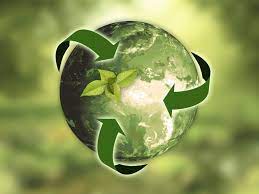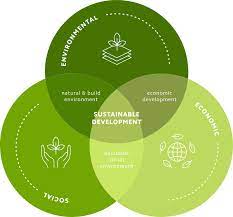Do you want to Attain Sustainability in your Agribusiness Venture?
Do you want to build a Sustainable Agribusiness?
Do you want to learn more about Sustainability?
Do you want to Develop Sustainability Strategy for your Agribusiness?
If "Yes", this page is meant for you.
READ ON
What Is Sustainability?
In the broadest sense, sustainability refers to the ability to maintain or support a process continuously over time. In business and policy contexts, sustainability seeks to prevent the depletion of natural or physical resources, so that they will remain available for the long term. Accordingly, sustainable policies emphasize the future effect of any given policy or business practice on humans, ecosystems, and the wider economy. The concept often corresponds to the belief that without major changes to the way the planet is run, it will suffer irreparable damage. As concerns about anthropogenic climate change, biodiversity loss, and pollution have become more widespread, the world has shifted to embrace sustainable practices and policies, primarily through the implementation of sustainable business practices and increased investments in green technology.
3 Pillars of Sustainability
The idea of sustainability is often broken down into three pillars: Economic, Environmental, and Social also known informally as the 3Ps - Profits, Planet, and People. In that breakdown, the concept of "economic sustainability" focuses on conserving the natural resources that provide physical inputs for economic production, including both renewable and exhaustible inputs. The concept of "environmental sustainability" adds greater emphasis on the life support systems, such as the atmosphere or soil, that must be maintained for economic production or human life to even occur. In contrast, "social sustainability" focuses on the human effects of economic systems, and the category includes attempts to eradicate poverty and hunger, as well as to combat inequality. In 1983, the United Nations created the World Commission on Environment and Development to study the connection between ecological health, economic development, and social equity. The commission, then run by former Norwegian Prime Minister - Gro Harlem Brundtland, published a report in 1987 that has become the standard in defining sustainable development. That report describes sustainable development, or the blueprint for attaining sustainability, as "meeting the needs of the present without compromising the ability of future generations to meet their own needs."
Corporate Sustainability
In business contexts, sustainability refers to more than just environmentalism. Harvard Business School lists two ways to measure sustainable business practices: the effect a business has on the environment, and the effect a business has on society, with the goal of sustainable practice being to have a positive impact on at least one of those areas. This view of responsibility encourages businesses to balance long-term benefits with immediate returns, and the goal of pursuing inclusive and environmentally sound objectives. This covers a broad array of possible practices. Cutting emissions, lowering energy usage, sourcing products from fair-trade organizations, and ensuring their physical waste is disposed of properly and with a smaller carbon footprint would qualify as moves toward sustainability. Companies have also set sustainability goals such as a commitment to zero-waste packaging by a certain year, or to reduce overall emissions by a certain percentage. Many corporations have made such sustainability promises in recent years. The push for sustainability is evident in areas such as energy generation as well, where the focus has been on finding new deposits to outpace the drawdown on existing reserves. Some electricity companies, for example, now publicly state goals for energy generation from sustainable sources such as wind, hydropower, and solar. Because these policies tend to generate public goodwill, some companies have been accused of "greenwashing," the practice of providing a false impression that makes a business seem more environmentally friendly than it is.
Cost Cutting
Moreover, many companies have been criticized for cost-cutting measures that make it harder to evaluate their sustainability. For example, many companies might move some parts of their business to less-regulated markets, such as by offshoring production to obtain cheaper labor. This can make it harder to assess the costs of production on workers and the environment.
Challenges Surrounding Business Sustainability
The switch to sustainability can be difficult. The Santa Fe Institute outlines three major impediments for firms seeking to improve their environmental impacts: First, it is hard to actually understand the impact of any individual firm. Second, it is difficult to rank the environmental impact of some activities, and finally, it is difficult to predict how economic agents respond to changing incentives. Sustainable investing surveys over the past couple of years have suggested that half (or in some cases, more than half) of investors say that sustainability is "fundamental" to investing strategy. Not everyone concerned with investments shares the enthusiasm. sustainability directs capital toward certain businesses.
Benefits of Business Sustainability
In addition to the social benefits of improving the environment and elevating human needs, there are also financial benefits for companies that successfully implement sustainability strategies. Using resources sustainability can improve the long-term viability of a business concern, just as cutting waste and pollution can also help a company save money. For example, using more efficient lighting and plumbing fixtures can help a company save on utility bills, as well as improve its public image. There may also be government tax incentives for companies that adopt certain sustainability practices. Sustainability can also make a company more attractive to investors.
Creating a Sustainable Business Strategy
Many corporations are seeking to integrate sustainability practices into their core business models. Companies can adopt sustainability strategies in the same way that they develop their other strategic plans. The first step to integrating sustainability practices is to identify a specific weakness shortcoming. For example, a company might determine that it generates too much waste, or that its hiring practices are causing harm to the surrounding communities. Next, the company should determine its goals, and identify the metrics it will use to measure its achievements. A company might set an ambitious target for reducing its carbon footprint, or set a specific percentage goal for diversity hiring. This will allow the company to determine objectively if its goals have been met. The final step is to implement the strategy and assess its results. This requires continuous re-evaluation, as a company's goals may change as the company grows.
Pit-Falls
There are some common pitfalls for companies aiming for sustainability. One of them is the knowledge-action gap: even though many executives set sustainability as one of their core business values, few of them take concrete actions to accomplish sustainability objectives. Another is known as the compliance-competitiveness gap. While improving sustainability metrics can make a company more competitive in the market, these goals should not be confused with the mandatory compliance requirements that a company must adhere to. While sustainability is desirable, compliance is mandatory
Real-World Example
An interesting example of a successful sustainability strategy is Unilever, the parent company of Dove soaps, Axe body spray, Ben & Jerry's Ice Cream, Hellmann's mayonnaise, and many other familiar brands. In 2010, the company implemented the Unilever Sustainable Living Plan, a ten-year blueprint for reducing the environmental impact of its brands while providing a more fair workplace. By the end of Unilever Sustainable Living Plan, the company was able to announce major achievements in improving its environmental footprint as well as the company's bottom line. By working to conserve water and energy, the company was able to save more than 1 billion euros between 2008 and 2018. Moreover, by creating more opportunities for women, Unilever also become the preferred consumer goods employer for graduate students in 50 countries.
NEED HELP ATTAINING SUSTAINABILITY, DEVELOPING SUSTAINABILITY STRATEGY AND BUILDING A SUSTAINABLE AGRIBUSINESS VENTURE BY ADOPTING THE SUSTAINABILITY STRATEGY DEVELOPED BY THR TEAM OF FACILITATORS AT MEASUREIT247 - SLISV,
For enquiries, Contact:
Tobi Fatunmbi
email: tobi.measureit@gmail.com
mobile number: +2348163554014
Enjoyed this post? Never miss out on future posts by following us
JOIN MEASUREIT247 COMMUNITY ON FACEBOOK click here
LIKE MEASUREIT247 FACEBOOK PAGE click here
JOIN MEASUREIT247 COMMUNITY ON TELEGRAM click here








No comments:
Post a Comment
Post comments here...
To advertise on our Marketplace; include the following details:
Name of product or service:
Description:
Price:
Contact details (Phone number):
Location:
For Enhanced Commenting Engagements
Check our Comment Guide here